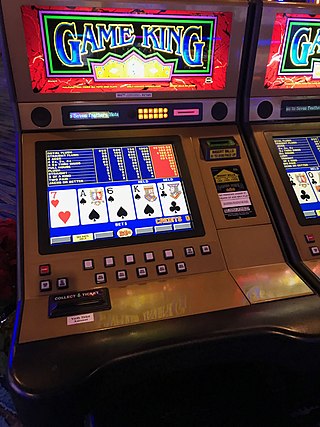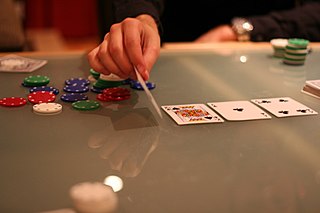
Blackjack is a casino banking game. It is the most widely played casino banking game in the world. It uses decks of 52 cards and descends from a global family of casino banking games known as "twenty-one". This family of card games also includes the European games vingt-et-un and pontoon, and the Russian game Ochko. Blackjack players do not compete against each other. The game is a comparing card game where each player competes against the dealer.
Five-card draw is a poker variant that is considered the simplest variant of poker, and is the basis for video poker. As a result, it is often the first variant learned by new players. It is commonly played in home games but rarely played in casino and tournament play. The variant is also offered by some online venues, although it is not as popular as other variants such as seven-card stud and Texas hold 'em.

Poker is a family of comparing card games in which players wager over which hand is best according to that specific game's rules. It is played worldwide, but in some places the rules may vary. While the earliest known form of the game was played with just 20 cards, today it is usually played with a standard deck, although in countries where short packs are common, it may be played with 32, 40 or 48 cards. Thus poker games vary in deck configuration, the number of cards in play, the number dealt face up or face down, and the number shared by all players, but all have rules that involve one or more rounds of betting.

Omaha hold 'em is a community card poker game similar to Texas hold 'em, where each player is dealt four cards and must make their best hand using exactly two of them, plus exactly three of the five community cards. The exact origin of the game is unknown, but casino executive Robert Turner first brought Omaha into a casino setting when he introduced the game to Bill Boyd, who offered it as a game at the Las Vegas Golden Nugget Casino. Omaha uses a 52-card French deck. Omaha hold 'em 8-or-better is the "O" game featured in H.O.R.S.E.
Pai gow poker is a version of pai gow that is played with playing cards, instead of traditional pai gow's Chinese dominoes. The game of pai gow poker was created in 1985 in the United States by Sam Torosian, owner of the Bell Card Club.
Five-card stud is the earliest form of the card game stud poker, originating during the American Civil War, but is less commonly played today than many other more popular poker games. It is still a popular game in parts of the world, especially in Finland where a specific variant of five-card stud called Sökö is played. The word sökö is also used for checking in Finland.

Texas hold 'em is one of the most popular variants of the card game of poker. Two cards, known as hole cards, are dealt face down to each player, and then five community cards are dealt face up in three stages. The stages consist of a series of three cards, later an additional single card, and a final card. Each player seeks the best five-card poker hand from any combination of the seven cards: the five community cards and their two hole cards. Players have betting options to check, call, raise, or fold. Rounds of betting take place before the flop is dealt and after each subsequent deal. The player who has the best hand and has not folded by the end of all betting rounds wins all of the money bet for the hand, known as the pot. In certain situations, a "split pot" or "tie" can occur when two players have hands of equivalent value. This is also called "chop the pot". Texas hold 'em is also the H game featured in HORSE and HOSE.

A poker tournament is a tournament where players compete by playing poker. It can feature as few as two players playing on a single table, and as many as tens of thousands of players playing on thousands of tables. The winner of the tournament is usually the person who wins every poker chip in the game and the others are awarded places based on the time of their elimination. To facilitate this, in most tournaments, blinds rise over the duration of the tournament. Unlike in a ring game, a player's chips in a tournament cannot be cashed out for money and serve only to determine the player's placing.

Video poker is a casino game based on five-card draw poker. It is played on a computerized console similar in size to a slot machine.
Caribbean stud poker, also called casino stud poker, is a casino table game with rules derived from five-card stud poker. However, unlike standard poker games, Caribbean stud poker is played against the house rather than against other players. There is no option to bluff or deceive as this is played against the house and not other players.
Razz is a form of stud poker that is normally played for ace-to-five low. It is one of the oldest forms of poker, and has been played since the start of the 20th century. It emerged around the time people started using the 52-card deck instead of 20 for poker.

Three Card Poker is a casino table game based on poker. It was designed in 1994 by Derek Webb.

Four Card Poker is a casino card game similar to Three Card Poker, invented by Roger Snow and owned by Shuffle Master.
The Poker Million has been a televised European poker tournament since its inception in November 2000. The final debuted to 30 million viewers and has since remained popular. It was created by UK gaming outfit Ladbrokes with the help of sports promotion firm Matchroom Sport. In 2009 sponsorship was transferred from Ladbrokes to Full Tilt Poker, which produced Poker Million VIII.

Casino Hold'em is a casino gambling game. This banking game, introduced by Stephen Au-Yeung in 2000 and now played in live casinos worldwide. It was licensed for use in the United Kingdom in 2007. In addition online casinos offer the game, which is based on the traditional multi-player Texas Hold'em Poker.
The following is a glossary of poker terms used in the card game of poker. It supplements the glossary of card game terms. Besides the terms listed here, there are thousands of common and uncommon poker slang terms. This is not intended to be a formal dictionary; precise usage details and multiple closely related senses are omitted here in favor of concise treatment of the basics.
Stud poker is any of a number of poker variants in which each player receives a mix of face-down and face-up cards dealt in multiple betting rounds. Stud games are also typically non-positional games, meaning that the player who bets first on each round may change from round to round. The cards dealt face down to each individual player are called hole cards, which gave rise to the common English expression ace in the hole for any hidden advantage.
Draw poker is any poker variant in which each player is dealt a complete hand before the first betting round, and then develops the hand for later rounds by replacing, or "drawing", cards.
Ultimate Texas Hold 'Em is registered trademark of Bally Gaming, Inc. and refers to a reinvented variant of the classic poker game Texas hold 'em. In this variation, the player does not compete against other players. Instead, they play only against the dealer. At any point during the course of the hand, the player is free to make one raise. In this poker-based game, the earlier the raise is made, the higher its value is.
Six-plus hold 'em is a community card poker game variant of Texas hold 'em, where the 2 through 5 cards are removed from the deck. Each player is dealt two cards face down and seeks to make the best five card poker hand from any combination of the seven cards.








